ACCT6007 - Analyzing AI & Blockchain's Impact on Accounting Profession
VerifiedAdded on 2023/06/13
|8
|2088
|201
Essay
AI Summary
This essay critically analyzes the impact of Artificial Intelligence (AI) and blockchain technology on the accounting profession. It begins by defining AI and blockchain, highlighting their potential to automate tasks, reduce costs, and enhance efficiency in accounting processes. The essay explores both the opportunities and threats these technologies pose, noting that while AI and blockchain can automate routine tasks, potentially displacing some accounting roles, they also create opportunities for accountants to focus on higher-level advisory and analytical work. The discussion encompasses the applications of these technologies in areas such as auditing, reconciliation, and due diligence, emphasizing the need for accountants to adapt their skills to include technology expertise. The essay further suggests that while blockchain can ensure the certainty of asset ownership and transaction history, the interpretation and valuation of these records will still require human judgment. It concludes by asserting that AI and blockchain present both challenges and prospects for the accounting profession, requiring continuous learning and adaptation to leverage the benefits of these emerging technologies.
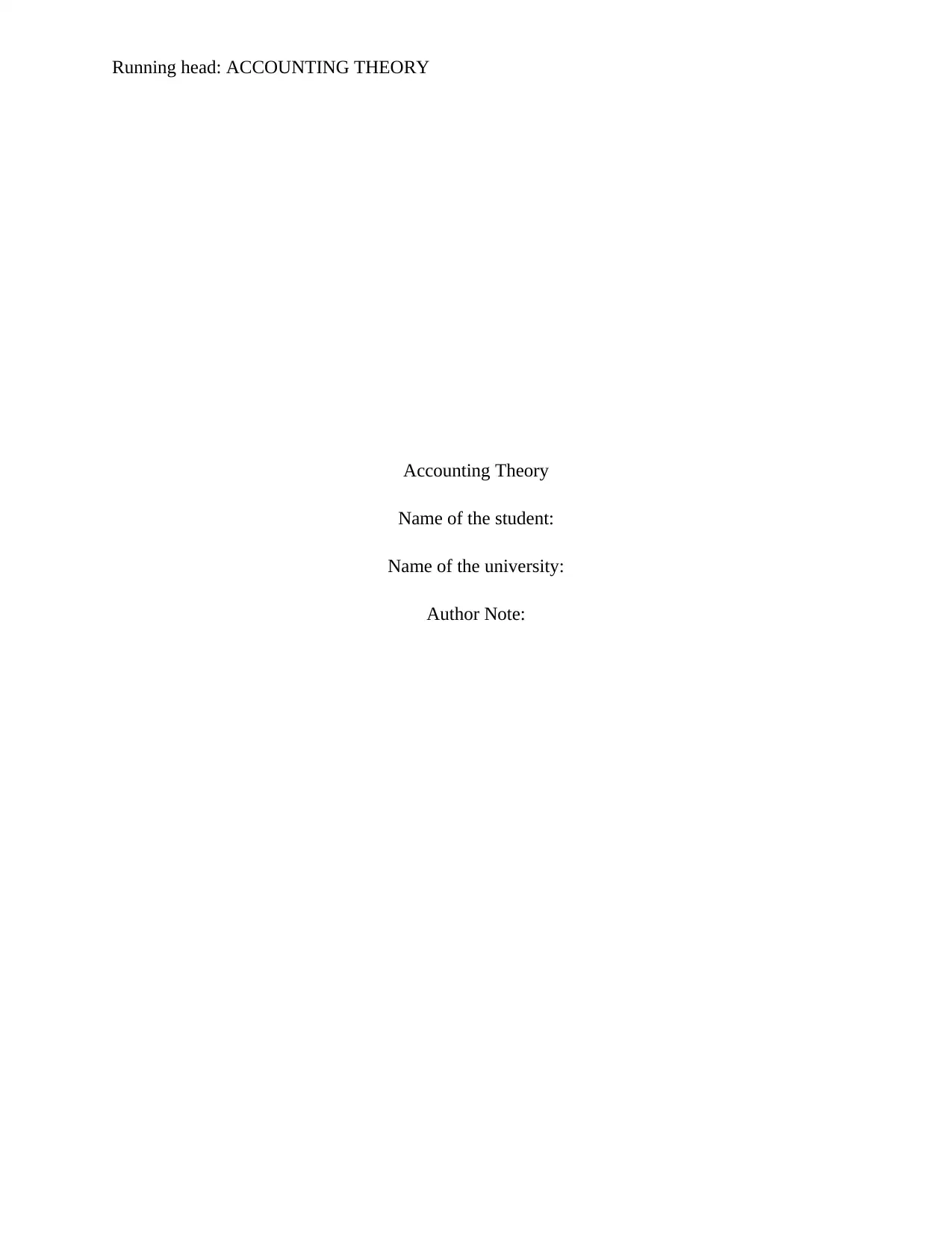
Running head: ACCOUNTING THEORY
Accounting Theory
Name of the student:
Name of the university:
Author Note:
Accounting Theory
Name of the student:
Name of the university:
Author Note:
Paraphrase This Document
Need a fresh take? Get an instant paraphrase of this document with our AI Paraphraser
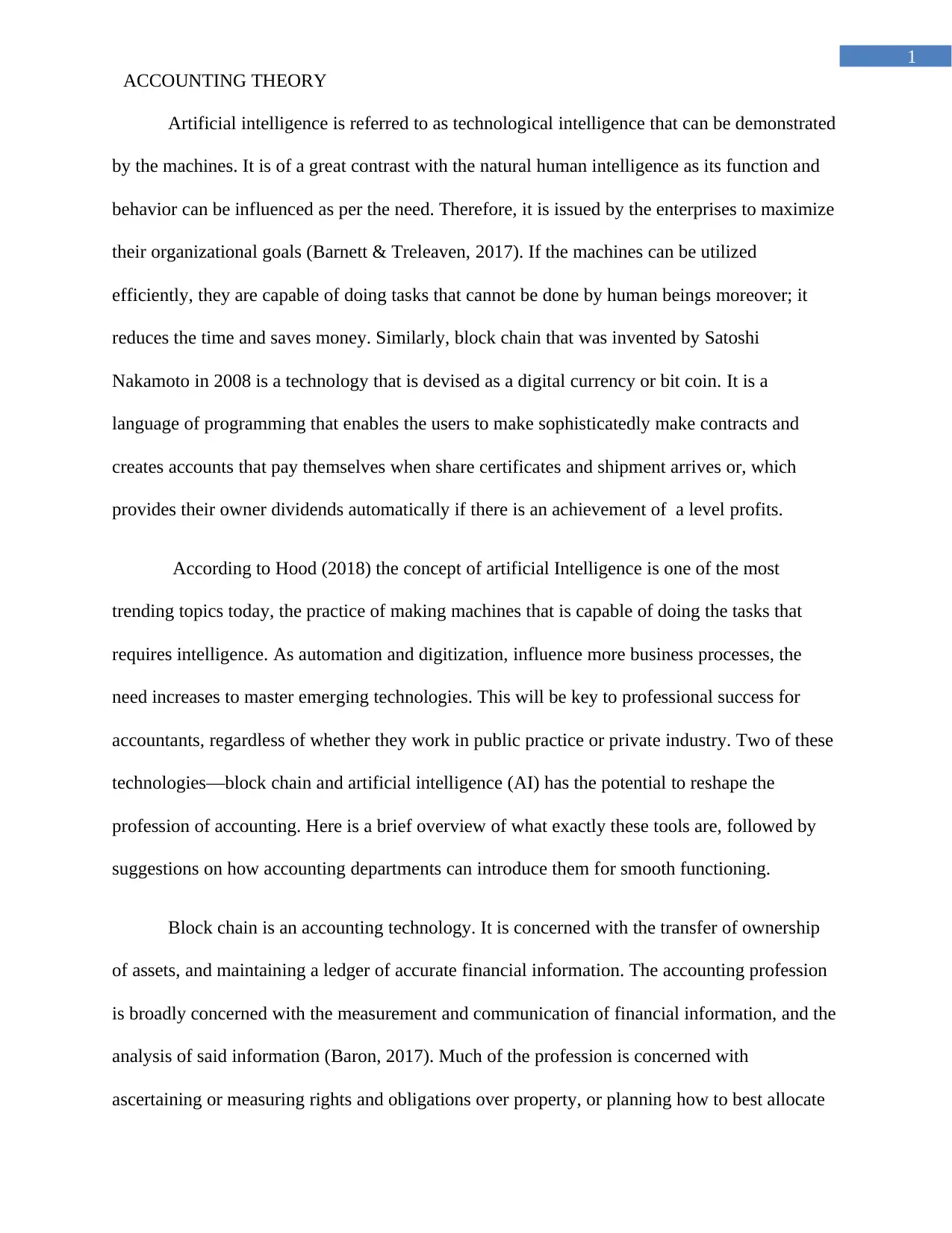
1
ACCOUNTING THEORY
Artificial intelligence is referred to as technological intelligence that can be demonstrated
by the machines. It is of a great contrast with the natural human intelligence as its function and
behavior can be influenced as per the need. Therefore, it is issued by the enterprises to maximize
their organizational goals (Barnett & Treleaven, 2017). If the machines can be utilized
efficiently, they are capable of doing tasks that cannot be done by human beings moreover; it
reduces the time and saves money. Similarly, block chain that was invented by Satoshi
Nakamoto in 2008 is a technology that is devised as a digital currency or bit coin. It is a
language of programming that enables the users to make sophisticatedly make contracts and
creates accounts that pay themselves when share certificates and shipment arrives or, which
provides their owner dividends automatically if there is an achievement of a level profits.
According to Hood (2018) the concept of artificial Intelligence is one of the most
trending topics today, the practice of making machines that is capable of doing the tasks that
requires intelligence. As automation and digitization, influence more business processes, the
need increases to master emerging technologies. This will be key to professional success for
accountants, regardless of whether they work in public practice or private industry. Two of these
technologies—block chain and artificial intelligence (AI) has the potential to reshape the
profession of accounting. Here is a brief overview of what exactly these tools are, followed by
suggestions on how accounting departments can introduce them for smooth functioning.
Block chain is an accounting technology. It is concerned with the transfer of ownership
of assets, and maintaining a ledger of accurate financial information. The accounting profession
is broadly concerned with the measurement and communication of financial information, and the
analysis of said information (Baron, 2017). Much of the profession is concerned with
ascertaining or measuring rights and obligations over property, or planning how to best allocate
ACCOUNTING THEORY
Artificial intelligence is referred to as technological intelligence that can be demonstrated
by the machines. It is of a great contrast with the natural human intelligence as its function and
behavior can be influenced as per the need. Therefore, it is issued by the enterprises to maximize
their organizational goals (Barnett & Treleaven, 2017). If the machines can be utilized
efficiently, they are capable of doing tasks that cannot be done by human beings moreover; it
reduces the time and saves money. Similarly, block chain that was invented by Satoshi
Nakamoto in 2008 is a technology that is devised as a digital currency or bit coin. It is a
language of programming that enables the users to make sophisticatedly make contracts and
creates accounts that pay themselves when share certificates and shipment arrives or, which
provides their owner dividends automatically if there is an achievement of a level profits.
According to Hood (2018) the concept of artificial Intelligence is one of the most
trending topics today, the practice of making machines that is capable of doing the tasks that
requires intelligence. As automation and digitization, influence more business processes, the
need increases to master emerging technologies. This will be key to professional success for
accountants, regardless of whether they work in public practice or private industry. Two of these
technologies—block chain and artificial intelligence (AI) has the potential to reshape the
profession of accounting. Here is a brief overview of what exactly these tools are, followed by
suggestions on how accounting departments can introduce them for smooth functioning.
Block chain is an accounting technology. It is concerned with the transfer of ownership
of assets, and maintaining a ledger of accurate financial information. The accounting profession
is broadly concerned with the measurement and communication of financial information, and the
analysis of said information (Baron, 2017). Much of the profession is concerned with
ascertaining or measuring rights and obligations over property, or planning how to best allocate
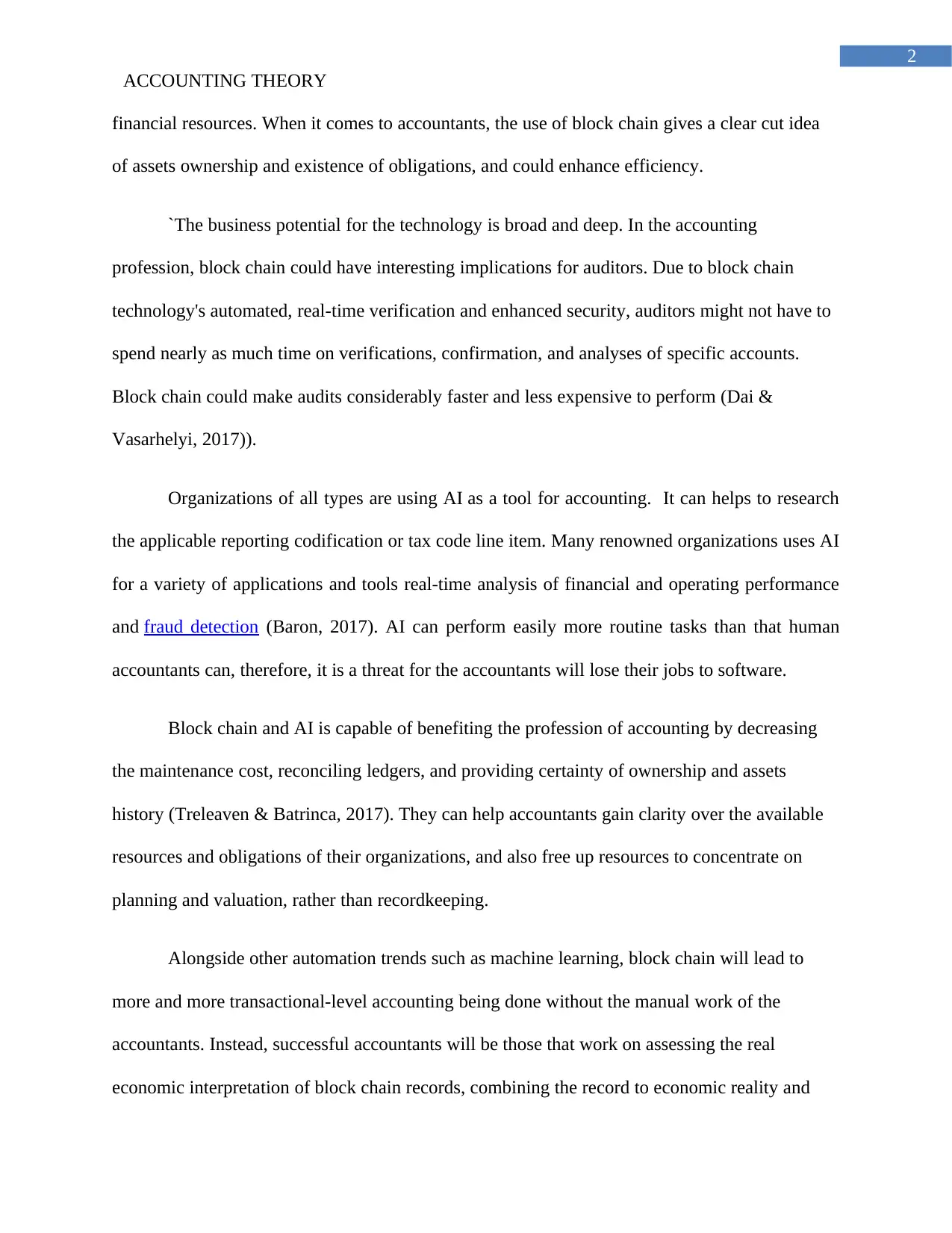
2
ACCOUNTING THEORY
financial resources. When it comes to accountants, the use of block chain gives a clear cut idea
of assets ownership and existence of obligations, and could enhance efficiency.
`The business potential for the technology is broad and deep. In the accounting
profession, block chain could have interesting implications for auditors. Due to block chain
technology's automated, real-time verification and enhanced security, auditors might not have to
spend nearly as much time on verifications, confirmation, and analyses of specific accounts.
Block chain could make audits considerably faster and less expensive to perform (Dai &
Vasarhelyi, 2017)).
Organizations of all types are using AI as a tool for accounting. It can helps to research
the applicable reporting codification or tax code line item. Many renowned organizations uses AI
for a variety of applications and tools real-time analysis of financial and operating performance
and fraud detection (Baron, 2017). AI can perform easily more routine tasks than that human
accountants can, therefore, it is a threat for the accountants will lose their jobs to software.
Block chain and AI is capable of benefiting the profession of accounting by decreasing
the maintenance cost, reconciling ledgers, and providing certainty of ownership and assets
history (Treleaven & Batrinca, 2017). They can help accountants gain clarity over the available
resources and obligations of their organizations, and also free up resources to concentrate on
planning and valuation, rather than recordkeeping.
Alongside other automation trends such as machine learning, block chain will lead to
more and more transactional-level accounting being done without the manual work of the
accountants. Instead, successful accountants will be those that work on assessing the real
economic interpretation of block chain records, combining the record to economic reality and
ACCOUNTING THEORY
financial resources. When it comes to accountants, the use of block chain gives a clear cut idea
of assets ownership and existence of obligations, and could enhance efficiency.
`The business potential for the technology is broad and deep. In the accounting
profession, block chain could have interesting implications for auditors. Due to block chain
technology's automated, real-time verification and enhanced security, auditors might not have to
spend nearly as much time on verifications, confirmation, and analyses of specific accounts.
Block chain could make audits considerably faster and less expensive to perform (Dai &
Vasarhelyi, 2017)).
Organizations of all types are using AI as a tool for accounting. It can helps to research
the applicable reporting codification or tax code line item. Many renowned organizations uses AI
for a variety of applications and tools real-time analysis of financial and operating performance
and fraud detection (Baron, 2017). AI can perform easily more routine tasks than that human
accountants can, therefore, it is a threat for the accountants will lose their jobs to software.
Block chain and AI is capable of benefiting the profession of accounting by decreasing
the maintenance cost, reconciling ledgers, and providing certainty of ownership and assets
history (Treleaven & Batrinca, 2017). They can help accountants gain clarity over the available
resources and obligations of their organizations, and also free up resources to concentrate on
planning and valuation, rather than recordkeeping.
Alongside other automation trends such as machine learning, block chain will lead to
more and more transactional-level accounting being done without the manual work of the
accountants. Instead, successful accountants will be those that work on assessing the real
economic interpretation of block chain records, combining the record to economic reality and
⊘ This is a preview!⊘
Do you want full access?
Subscribe today to unlock all pages.

Trusted by 1+ million students worldwide
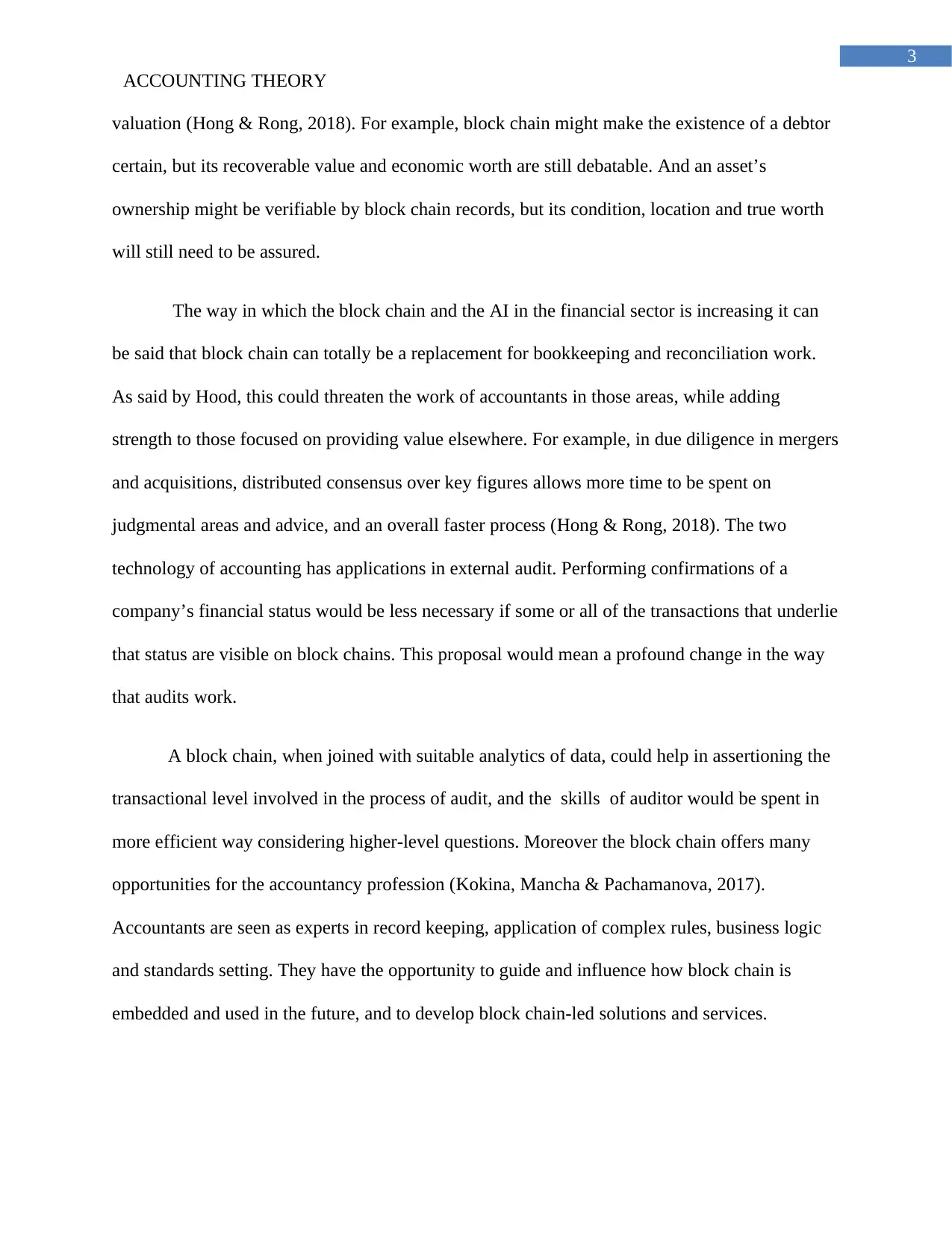
3
ACCOUNTING THEORY
valuation (Hong & Rong, 2018). For example, block chain might make the existence of a debtor
certain, but its recoverable value and economic worth are still debatable. And an asset’s
ownership might be verifiable by block chain records, but its condition, location and true worth
will still need to be assured.
The way in which the block chain and the AI in the financial sector is increasing it can
be said that block chain can totally be a replacement for bookkeeping and reconciliation work.
As said by Hood, this could threaten the work of accountants in those areas, while adding
strength to those focused on providing value elsewhere. For example, in due diligence in mergers
and acquisitions, distributed consensus over key figures allows more time to be spent on
judgmental areas and advice, and an overall faster process (Hong & Rong, 2018). The two
technology of accounting has applications in external audit. Performing confirmations of a
company’s financial status would be less necessary if some or all of the transactions that underlie
that status are visible on block chains. This proposal would mean a profound change in the way
that audits work.
A block chain, when joined with suitable analytics of data, could help in assertioning the
transactional level involved in the process of audit, and the skills of auditor would be spent in
more efficient way considering higher-level questions. Moreover the block chain offers many
opportunities for the accountancy profession (Kokina, Mancha & Pachamanova, 2017).
Accountants are seen as experts in record keeping, application of complex rules, business logic
and standards setting. They have the opportunity to guide and influence how block chain is
embedded and used in the future, and to develop block chain-led solutions and services.
ACCOUNTING THEORY
valuation (Hong & Rong, 2018). For example, block chain might make the existence of a debtor
certain, but its recoverable value and economic worth are still debatable. And an asset’s
ownership might be verifiable by block chain records, but its condition, location and true worth
will still need to be assured.
The way in which the block chain and the AI in the financial sector is increasing it can
be said that block chain can totally be a replacement for bookkeeping and reconciliation work.
As said by Hood, this could threaten the work of accountants in those areas, while adding
strength to those focused on providing value elsewhere. For example, in due diligence in mergers
and acquisitions, distributed consensus over key figures allows more time to be spent on
judgmental areas and advice, and an overall faster process (Hong & Rong, 2018). The two
technology of accounting has applications in external audit. Performing confirmations of a
company’s financial status would be less necessary if some or all of the transactions that underlie
that status are visible on block chains. This proposal would mean a profound change in the way
that audits work.
A block chain, when joined with suitable analytics of data, could help in assertioning the
transactional level involved in the process of audit, and the skills of auditor would be spent in
more efficient way considering higher-level questions. Moreover the block chain offers many
opportunities for the accountancy profession (Kokina, Mancha & Pachamanova, 2017).
Accountants are seen as experts in record keeping, application of complex rules, business logic
and standards setting. They have the opportunity to guide and influence how block chain is
embedded and used in the future, and to develop block chain-led solutions and services.
Paraphrase This Document
Need a fresh take? Get an instant paraphrase of this document with our AI Paraphraser
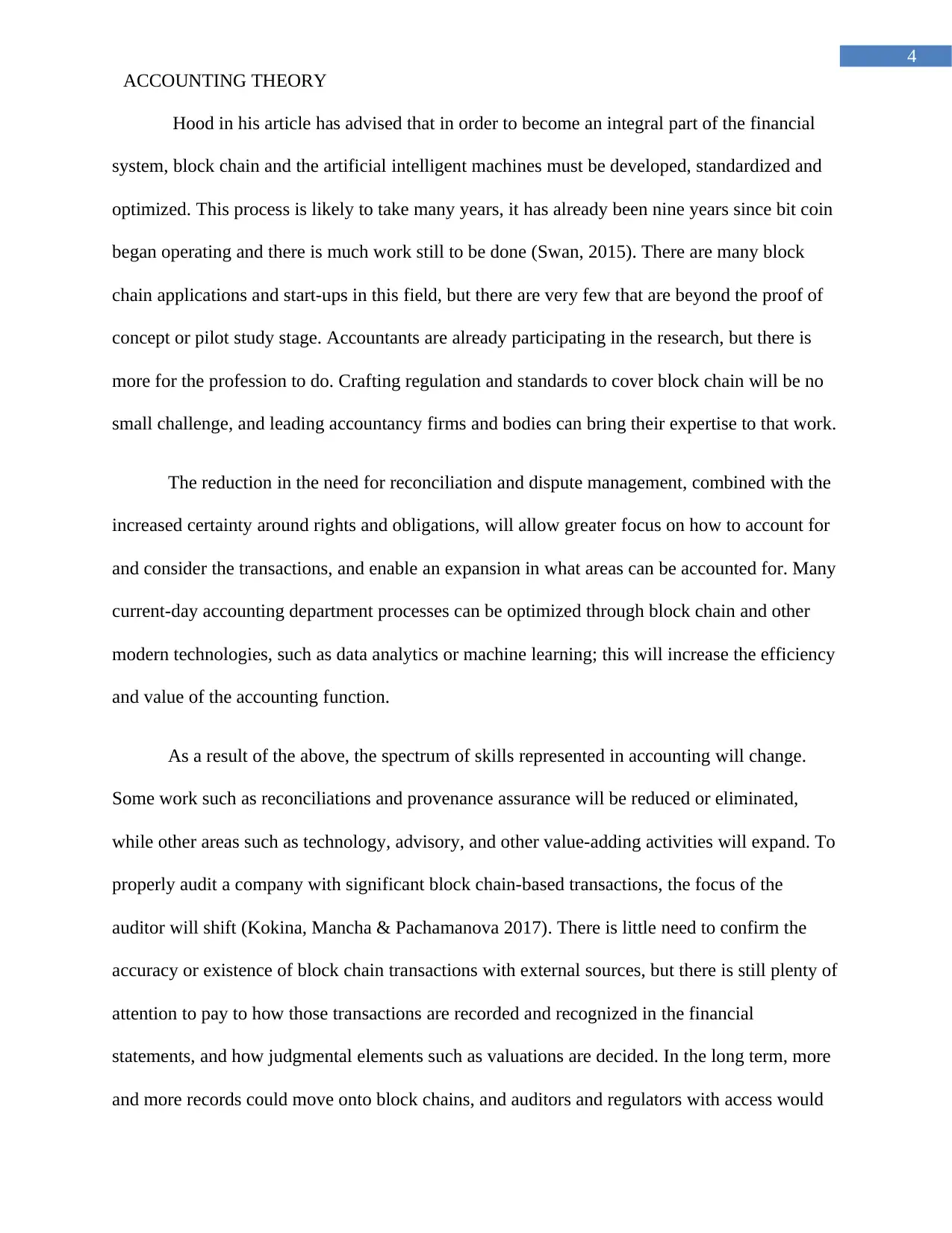
4
ACCOUNTING THEORY
Hood in his article has advised that in order to become an integral part of the financial
system, block chain and the artificial intelligent machines must be developed, standardized and
optimized. This process is likely to take many years, it has already been nine years since bit coin
began operating and there is much work still to be done (Swan, 2015). There are many block
chain applications and start-ups in this field, but there are very few that are beyond the proof of
concept or pilot study stage. Accountants are already participating in the research, but there is
more for the profession to do. Crafting regulation and standards to cover block chain will be no
small challenge, and leading accountancy firms and bodies can bring their expertise to that work.
The reduction in the need for reconciliation and dispute management, combined with the
increased certainty around rights and obligations, will allow greater focus on how to account for
and consider the transactions, and enable an expansion in what areas can be accounted for. Many
current-day accounting department processes can be optimized through block chain and other
modern technologies, such as data analytics or machine learning; this will increase the efficiency
and value of the accounting function.
As a result of the above, the spectrum of skills represented in accounting will change.
Some work such as reconciliations and provenance assurance will be reduced or eliminated,
while other areas such as technology, advisory, and other value-adding activities will expand. To
properly audit a company with significant block chain-based transactions, the focus of the
auditor will shift (Kokina, Mancha & Pachamanova 2017). There is little need to confirm the
accuracy or existence of block chain transactions with external sources, but there is still plenty of
attention to pay to how those transactions are recorded and recognized in the financial
statements, and how judgmental elements such as valuations are decided. In the long term, more
and more records could move onto block chains, and auditors and regulators with access would
ACCOUNTING THEORY
Hood in his article has advised that in order to become an integral part of the financial
system, block chain and the artificial intelligent machines must be developed, standardized and
optimized. This process is likely to take many years, it has already been nine years since bit coin
began operating and there is much work still to be done (Swan, 2015). There are many block
chain applications and start-ups in this field, but there are very few that are beyond the proof of
concept or pilot study stage. Accountants are already participating in the research, but there is
more for the profession to do. Crafting regulation and standards to cover block chain will be no
small challenge, and leading accountancy firms and bodies can bring their expertise to that work.
The reduction in the need for reconciliation and dispute management, combined with the
increased certainty around rights and obligations, will allow greater focus on how to account for
and consider the transactions, and enable an expansion in what areas can be accounted for. Many
current-day accounting department processes can be optimized through block chain and other
modern technologies, such as data analytics or machine learning; this will increase the efficiency
and value of the accounting function.
As a result of the above, the spectrum of skills represented in accounting will change.
Some work such as reconciliations and provenance assurance will be reduced or eliminated,
while other areas such as technology, advisory, and other value-adding activities will expand. To
properly audit a company with significant block chain-based transactions, the focus of the
auditor will shift (Kokina, Mancha & Pachamanova 2017). There is little need to confirm the
accuracy or existence of block chain transactions with external sources, but there is still plenty of
attention to pay to how those transactions are recorded and recognized in the financial
statements, and how judgmental elements such as valuations are decided. In the long term, more
and more records could move onto block chains, and auditors and regulators with access would
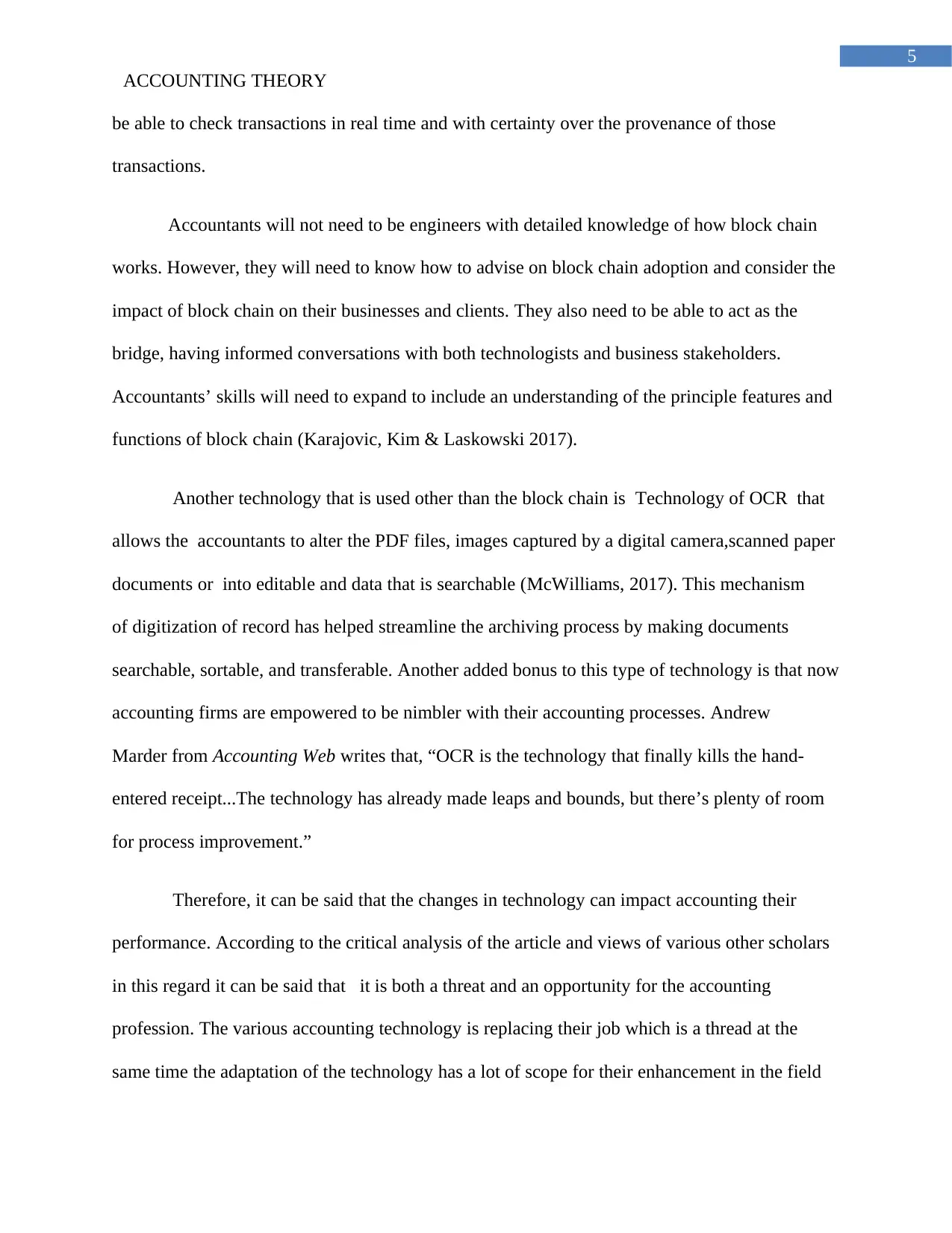
5
ACCOUNTING THEORY
be able to check transactions in real time and with certainty over the provenance of those
transactions.
Accountants will not need to be engineers with detailed knowledge of how block chain
works. However, they will need to know how to advise on block chain adoption and consider the
impact of block chain on their businesses and clients. They also need to be able to act as the
bridge, having informed conversations with both technologists and business stakeholders.
Accountants’ skills will need to expand to include an understanding of the principle features and
functions of block chain (Karajovic, Kim & Laskowski 2017).
Another technology that is used other than the block chain is Technology of OCR that
allows the accountants to alter the PDF files, images captured by a digital camera,scanned paper
documents or into editable and data that is searchable (McWilliams, 2017). This mechanism
of digitization of record has helped streamline the archiving process by making documents
searchable, sortable, and transferable. Another added bonus to this type of technology is that now
accounting firms are empowered to be nimbler with their accounting processes. Andrew
Marder from Accounting Web writes that, “OCR is the technology that finally kills the hand-
entered receipt...The technology has already made leaps and bounds, but there’s plenty of room
for process improvement.”
Therefore, it can be said that the changes in technology can impact accounting their
performance. According to the critical analysis of the article and views of various other scholars
in this regard it can be said that it is both a threat and an opportunity for the accounting
profession. The various accounting technology is replacing their job which is a thread at the
same time the adaptation of the technology has a lot of scope for their enhancement in the field
ACCOUNTING THEORY
be able to check transactions in real time and with certainty over the provenance of those
transactions.
Accountants will not need to be engineers with detailed knowledge of how block chain
works. However, they will need to know how to advise on block chain adoption and consider the
impact of block chain on their businesses and clients. They also need to be able to act as the
bridge, having informed conversations with both technologists and business stakeholders.
Accountants’ skills will need to expand to include an understanding of the principle features and
functions of block chain (Karajovic, Kim & Laskowski 2017).
Another technology that is used other than the block chain is Technology of OCR that
allows the accountants to alter the PDF files, images captured by a digital camera,scanned paper
documents or into editable and data that is searchable (McWilliams, 2017). This mechanism
of digitization of record has helped streamline the archiving process by making documents
searchable, sortable, and transferable. Another added bonus to this type of technology is that now
accounting firms are empowered to be nimbler with their accounting processes. Andrew
Marder from Accounting Web writes that, “OCR is the technology that finally kills the hand-
entered receipt...The technology has already made leaps and bounds, but there’s plenty of room
for process improvement.”
Therefore, it can be said that the changes in technology can impact accounting their
performance. According to the critical analysis of the article and views of various other scholars
in this regard it can be said that it is both a threat and an opportunity for the accounting
profession. The various accounting technology is replacing their job which is a thread at the
same time the adaptation of the technology has a lot of scope for their enhancement in the field
⊘ This is a preview!⊘
Do you want full access?
Subscribe today to unlock all pages.

Trusted by 1+ million students worldwide
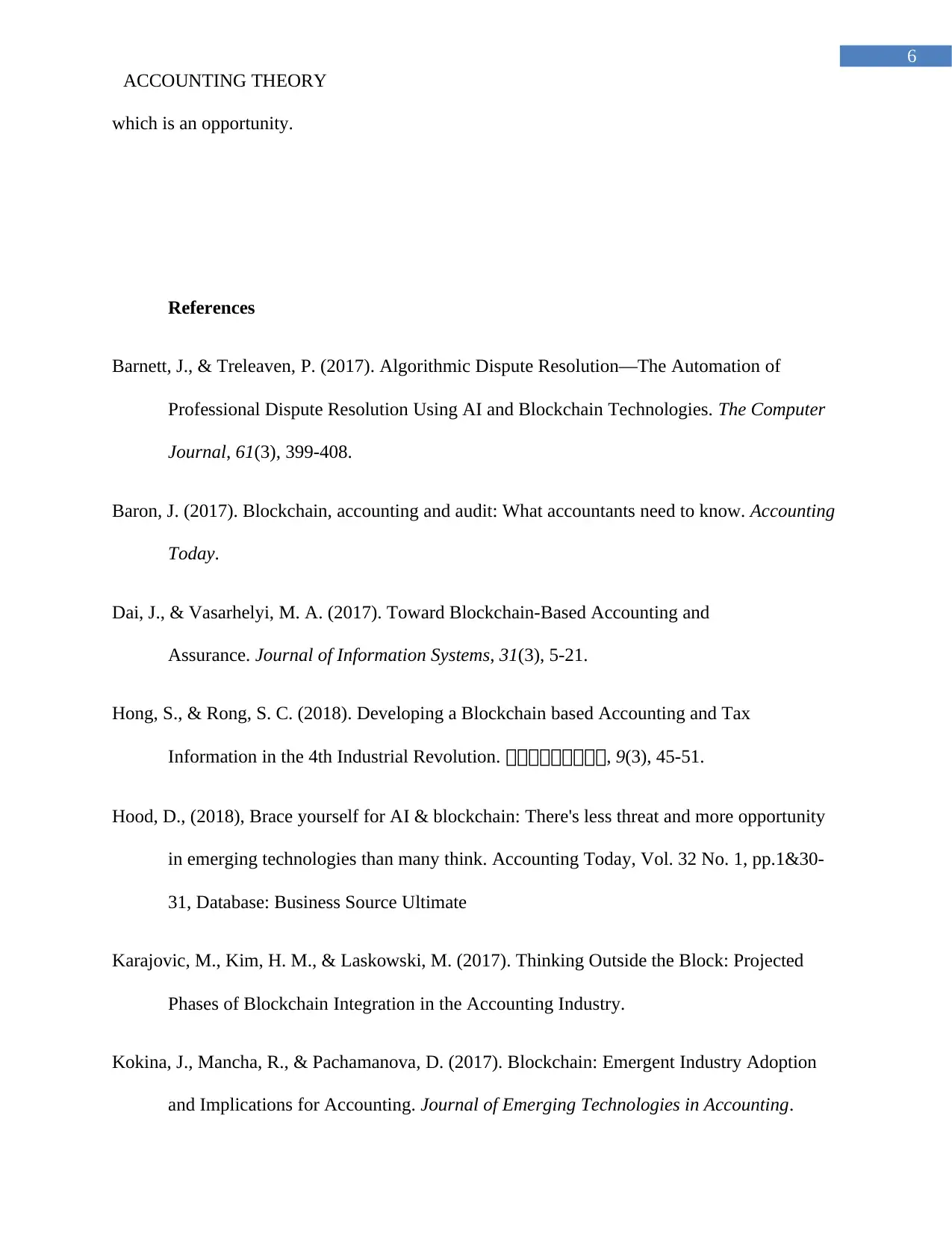
6
ACCOUNTING THEORY
which is an opportunity.
References
Barnett, J., & Treleaven, P. (2017). Algorithmic Dispute Resolution—The Automation of
Professional Dispute Resolution Using AI and Blockchain Technologies. The Computer
Journal, 61(3), 399-408.
Baron, J. (2017). Blockchain, accounting and audit: What accountants need to know. Accounting
Today.
Dai, J., & Vasarhelyi, M. A. (2017). Toward Blockchain-Based Accounting and
Assurance. Journal of Information Systems, 31(3), 5-21.
Hong, S., & Rong, S. C. (2018). Developing a Blockchain based Accounting and Tax
Information in the 4th Industrial Revolution. 한한한한한한한한한, 9(3), 45-51.
Hood, D., (2018), Brace yourself for AI & blockchain: There's less threat and more opportunity
in emerging technologies than many think. Accounting Today, Vol. 32 No. 1, pp.1&30-
31, Database: Business Source Ultimate
Karajovic, M., Kim, H. M., & Laskowski, M. (2017). Thinking Outside the Block: Projected
Phases of Blockchain Integration in the Accounting Industry.
Kokina, J., Mancha, R., & Pachamanova, D. (2017). Blockchain: Emergent Industry Adoption
and Implications for Accounting. Journal of Emerging Technologies in Accounting.
ACCOUNTING THEORY
which is an opportunity.
References
Barnett, J., & Treleaven, P. (2017). Algorithmic Dispute Resolution—The Automation of
Professional Dispute Resolution Using AI and Blockchain Technologies. The Computer
Journal, 61(3), 399-408.
Baron, J. (2017). Blockchain, accounting and audit: What accountants need to know. Accounting
Today.
Dai, J., & Vasarhelyi, M. A. (2017). Toward Blockchain-Based Accounting and
Assurance. Journal of Information Systems, 31(3), 5-21.
Hong, S., & Rong, S. C. (2018). Developing a Blockchain based Accounting and Tax
Information in the 4th Industrial Revolution. 한한한한한한한한한, 9(3), 45-51.
Hood, D., (2018), Brace yourself for AI & blockchain: There's less threat and more opportunity
in emerging technologies than many think. Accounting Today, Vol. 32 No. 1, pp.1&30-
31, Database: Business Source Ultimate
Karajovic, M., Kim, H. M., & Laskowski, M. (2017). Thinking Outside the Block: Projected
Phases of Blockchain Integration in the Accounting Industry.
Kokina, J., Mancha, R., & Pachamanova, D. (2017). Blockchain: Emergent Industry Adoption
and Implications for Accounting. Journal of Emerging Technologies in Accounting.
Paraphrase This Document
Need a fresh take? Get an instant paraphrase of this document with our AI Paraphraser
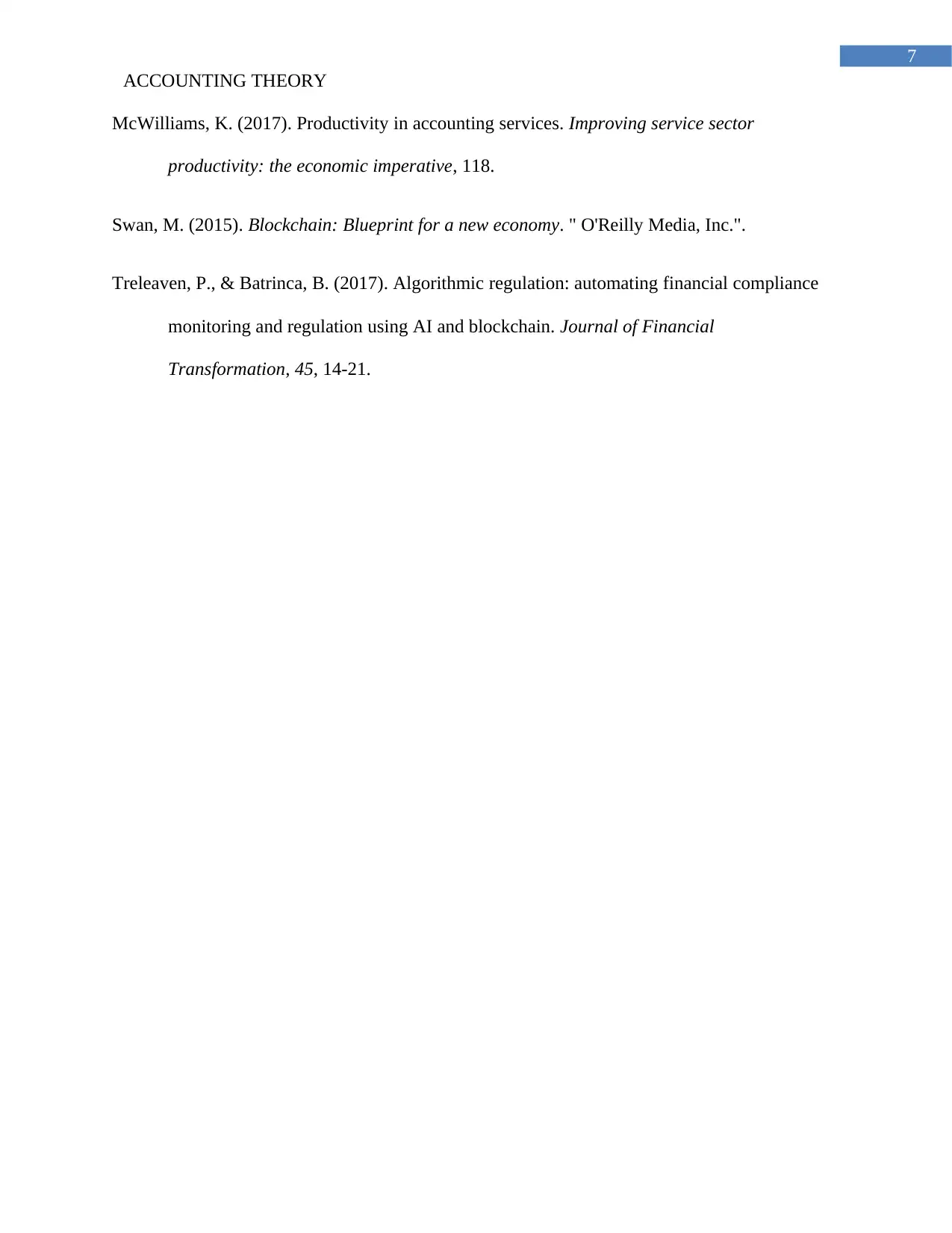
7
ACCOUNTING THEORY
McWilliams, K. (2017). Productivity in accounting services. Improving service sector
productivity: the economic imperative, 118.
Swan, M. (2015). Blockchain: Blueprint for a new economy. " O'Reilly Media, Inc.".
Treleaven, P., & Batrinca, B. (2017). Algorithmic regulation: automating financial compliance
monitoring and regulation using AI and blockchain. Journal of Financial
Transformation, 45, 14-21.
ACCOUNTING THEORY
McWilliams, K. (2017). Productivity in accounting services. Improving service sector
productivity: the economic imperative, 118.
Swan, M. (2015). Blockchain: Blueprint for a new economy. " O'Reilly Media, Inc.".
Treleaven, P., & Batrinca, B. (2017). Algorithmic regulation: automating financial compliance
monitoring and regulation using AI and blockchain. Journal of Financial
Transformation, 45, 14-21.
1 out of 8
Related Documents
Your All-in-One AI-Powered Toolkit for Academic Success.
+13062052269
info@desklib.com
Available 24*7 on WhatsApp / Email
![[object Object]](/_next/static/media/star-bottom.7253800d.svg)
Unlock your academic potential
Copyright © 2020–2026 A2Z Services. All Rights Reserved. Developed and managed by ZUCOL.
